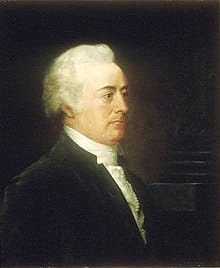John Rutledge (1739-1800), one of the inaugural justices of the U.S. Supreme Court, was born in Charleston, South Carolina, and received his legal education at the Middle Temple in England. He was a plantation owner who lost much of his property during the Revolutionary War and was eventually overwhelmed with debt, in part because he devoted so much of his life to public service.
Rutledge’s positions included stints as his state’s attorney general; as a member of the South Carolina assembly; as a delegate to the Stamp Act and Continental Congresses; as the first president, and later as governor, of South Carolina; as a delegate to the Constitutional Convention of 1787, where he served on a number of important committees including the committee that formulated the Connecticut Compromise and the Committee of Detail; and as chief justice of the South Carolina Supreme Court.
George Washington named John Rutledge to first Supreme Court
He was named by President George Washington as an associate justice of the new U.S. Supreme Court where he served from 1790 to 1791, returning briefly in 1795, as chief justice.
Rutledge was a gifted orator with a keen legal mind who strongly supported balanced government and the protection of property rights. He was especially devoted to the freedoms of speech and press, even before they were incorporated into the First Amendment. He had, however, supported Christianity as the established religion of South Carolina until it was disestablished by the state constitution of 1790.
Rutledge supported a free press against seditious libel charges
During his early service in the South Carolina legislature, Rutledge strongly supported appropriating money for the support of John Wilkes, whose house had been searched, who had been tried for seditious libel, and who had been barred from his seat in the British Parliament.
In a similar fight within his home state, Rutledge defended Thomas Powell, the editor of the South Carolina Gazette who had been charged with seditious libel for publishing dissents from the Governor’s Council in 1773. At the Constitution Convention of 1787, he later supported the publication of the journals of Congress.
Rejecting the authority of the British Parliament over the American colonies, Rutledge strongly opposed British laws that would have classified criticisms of the king as treasonous (Bird 2016, 145).
Although South Carolina had granted Rutledge almost unlimited powers as governor, he did not use these powers to interfere with the freedoms of either speech or press. Moreover, the weight of the evidence suggests that he did not support the Sedition Act of 1798, which impinged on both freedom of speech and press.
Rutledge failed to receive Senate confirmation as chief justice
Rutledge’s own candid speech eventually cost him the chief justiceship. Although George Washington had given him an interim appointment after Chief Justice John Jay resigned, Rutledge, who did not yet know of this appointment, had given a passionate speech against Jay’s Treaty. This speech did not sit well with fellow Federalists who had also heard reports of his bizarre behavior after the death of his wife, including two unsuccessful suicide attempts, and refused to confirm him. (He had already resigned for health reasons before getting the news.)
Although he had defended slavery interests at the Constitutional Convention of 1787 and faced financial difficulties, he had freed all but one of his slaves by the time of his death. Rutledge was succeeded as chief justice of the Unites States by Oliver Ellsworth.
John R. Vile is a professor of political science and dean of the Honors College at Middle Tennessee State University.

